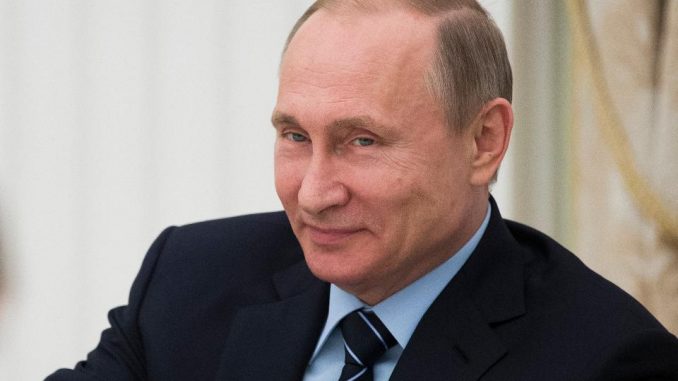
Recent news that Ukrainian ships had attempted an unannounced marine passage from the Black Sea through the Kerch Strait into the Sea of Azov created a significant crisis that could easily have escalated to war. Not surprisingly, the Atlantic Council, a card-carrying member of the American Deep State, weighed in with its opinion on the events.
Here is a map showing the region with Russia located in the west and centre part of the map (Crimean peninsula), the Sea of Azov in the centre of the map and Ukraine in the northeast corner of the map:
Here is a photo of the ship blocking passage under the recently opened 745 foot long, $3.69 billion Kerch Strait Bridge which connects mainland Russia with the Crimean Peninsula:
Here is a map showing how marine traffic has backed up as a result of Russia’s blocking of the Kerch Strait in an effort to control its territorial waters since Crimea is now part of Russia:
Let’s now take a look at what the Atlantic Council had to say about this brewing storm:
“Escalating tensions between Russia and Ukraine in the Sea of Azov bear echoes of Russian provocations that led to the war with Georgia in the summer of 2008.
“For months, Russian forces have been working to make the Azov Sea an internal Russian body of water in order to both cut off Ukraine’s eastern ports and cement Moscow’s hold on Crimea,” said Damon Wilson, executive vice president of the Atlantic Council.
“Moscow’s incrementalist approach is like the ‘creeping annexation’ we witnessed in Georgia in 2008—any single move tends not to be dramatic, but in the aggregate Russia makes strategic gains. Today, the Russians escalated with the aim of intimidating Ukraine into backing off its own effort to assert its access to these international waters and its own ports,” he added.
Tensions between Ukraine and Russia dramatically escalated on November 25 with Kyiv saying a Russian coast guard vessel rammed one of its navy tugboats in the Sea of Azov, while Moscow shut off access to the sea accusing Ukrainian vessels of passing through its territorial waters without permission. Russia reportedly seized three Ukrainian naval vessels. Ukraine said Russian forces fired on the vessels and six crewmembers were injured. Ukrainian President Petro Poroshenko said he would propose that parliament declare martial law in the country in response to the situation.
“For those who follow Kremlin policy in its neighborhood, this looks dangerously familiar,” said John E. Herbst, director of the Atlantic Council’s Eurasia Center.
“Moscow committed provocations against Georgia for years: military overflights, random missiles landing in Georgian territory and, of course, firing across the internal demarcation line between parts of Georgia hosting Russian troops and the rest of Georgia. Such firing from South Ossetia led to the Russia-Georgia war in 2008,” he explained.
Michael Carpenter, a nonresident senior fellow with the Atlantic Council’s Eurasia Center, said: “Russia’s seizure of Ukrainian ships transiting the Kerch Strait between the Black and Azov Seas is part of a larger Russian strategy to gain control over the Azov Sea and blockade Ukrainian maritime traffic in and out of the Kerch Strait.”
“This move is clearly a violation of international law and adds a new dimension to Russia’s four-and-a-half-year-old war against Ukraine,” he added.
Carpenter said the United States should “respond immediately by giving Ukraine radars to boost its maritime domain awareness and land-based anti-ship missiles so it can defend its Azov Sea littoral.”
“The United States should also impose a complete asset freeze on at least one major Russian bank, such as Sberbank, VTB, or Gazprombank. The sanctioning of a Russian bank—or several banks if Russia fails to respond initially—should be made conditional on Russia restoring Ukraine’s access to its own ports and withdrawing its troops from the Donbas. Until this happens, the costs on the Kremlin should continue to mount,” he added.
Anders Åslund, a resident senior fellow in the Atlantic Council’s Eurasia Center, said: “NATO and the United States should send in naval ships in the Sea of Azov to guarantee that it stays open to international shipping.”
Such action, Åslund said, “would be in full compliance with the UN Law of the Sea Convention of 1982 and the Montreux Convention Regarding the Regime of the Straits of 1936.”
The Sea of Azov has become a point of friction between Moscow and Kyiv since Russia seized Crimea in March 2014.
“Ever since Russia annexed Crimea in March 2014, it has prepared for turning the international Sea of Azov into internal Russian waters, blocking a large share of the Ukrainian coasts and two major commercial ports, Mariupol and Berdyansk,” said Åslund.” (my bolds)
It’s pretty obvious that the Atlantic Council’s aim is to further inflame tensions in the region by adding anti-ship missiles, ships from the United States Navy and further anti-Russian sanctions into the mix and by accusing Russia of attempting to start another war in the region.
In case you have forgotten, here is a list of major contributors (or what they term as “Communities of Influence”) to the Atlantic Council:
Notice the following major contributors:
Foreign and Commonwealth Office of the United Kingdom
United States Department of State
General Atomics
United Technologies Corporation
Lockheed Martin Corporation
Raytheon Company
Thales SA (a French Aerospace and Defense company)
United States Air Force Academy
The Boeing Company
Textron
Ukrainian Canadian Congress
United States Air Force
US Mission to NATO
Influence, indeed. One would almost think that the Atlantic Council is pandering to its major contributors by recommending further military actions against Russia over the Kerch Strait events.
It is also important to remember that, back in May 2018, Facebook retained the Atlantic Council and its Digital Forensic Research Lab (aka Digital Sherlocks) to help protect those of us who are too stupid to discern Russian-based propaganda from Washington-based propaganda. This is the same group that is protecting us from that nasty Iranian propaganda as well.
Let’s close with this excerpt from the United Nations Convention on the Law of the Sea:
“1. Passage is innocent so long as it is not prejudicial to the peace, good order or security of the coastal State. Such passage shall take place in conformity with this Convention and with other rules of international law.
2. Passage of a foreign ship shall be considered to be prejudicial to the peace, good order or security of the coastal State if in the territorial sea it engages in any of the following activities:
(a) any threat or use of force against the sovereignty, territorial integrity or political independence of the coastal State, or in any other manner in violation of the principles of international law embodied in the Charter of the United Nations;
(b) any exercise or practice with weapons of any kind;
(c) any act aimed at collecting information to the prejudice of the defence or security of the coastal State;
(d) any act of propaganda aimed at affecting the defence or security of the coastal State;
(e) the launching, landing or taking on board of any aircraft;
f) the launching, landing or taking on board of any military device;
(g) the loading or unloading of any commodity, currency or person contrary to the customs, fiscal, immigration or sanitary laws and regulations of the coastal State;
(h) any act of wilful and serious pollution contrary to this Convention;
(i) any fishing activities;
(j) the carrying out of research or survey activities;
(k) any act aimed at interfering with any systems of communication or any other facilities or installations of the coastal State;
(l) any other activity not having a direct bearing on passage.” (my bold)
One at least has to question the motives of Ukraine’s navy for taking this action, particularly in light of point (d) in the aforementioned excerpt from the Law of the Sea.
As we can see from this posting, the American-based non-elected and completely war-biased machinery is doing its very best to march us ever closer to war with Russia. It is obvious that the powerful Atlantic Council is acting in the best interests of its military-industrial-Congressional benefactors. Sadly for all of us, none of the members of the seedy underbelly of Washington will ever find themselves close to the front lines of the battle.
Click HERE to read more from this author.
You can publish this article on your website as long as you provide a link back to this page.

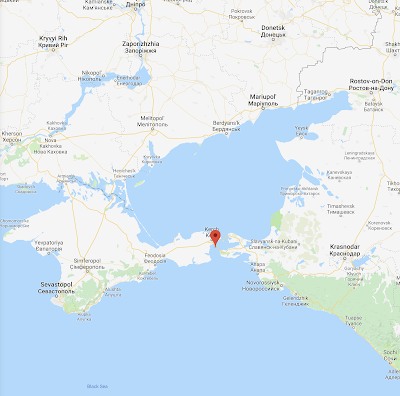
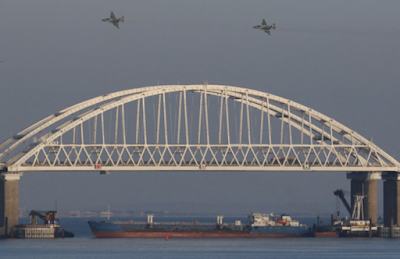
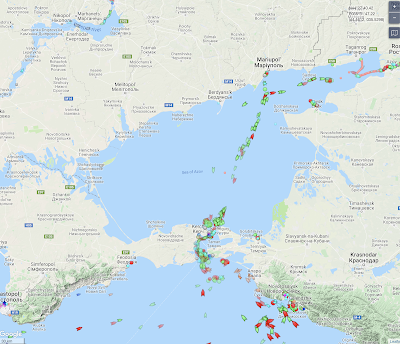
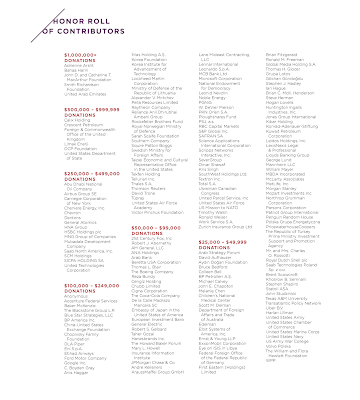
Be the first to comment